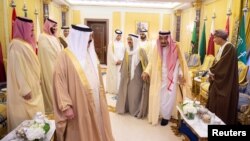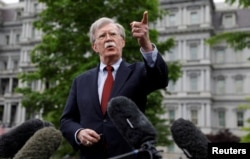Iran's deputy foreign minister, Abbas Arakji, wound up a three-nation Gulf visit to Oman, Kuwait and Qatar just as U.S. National Security Advisor John Bolton began a diplomatic visit to the United Arab Emirates. The diplomatic ballet comes just hours before Saudi Arabia convenes Arab, Islamic and Gulf summits in Mecca to discuss escalating tensions with Iran.
As preparations continue for the historic triple summit in Mecca Thursday, Iran, the United States and its Arab allies continue their diplomatic ballet in the lead-up to the talks. Fifty-seven nations are expected to attend the Islamic summit, which will take place alongside smaller Arab and Gulf Cooperation Council meetings.
At the same time, U.S. National Security Advisor John Bolton told journalists during a visit to the United Arab Emirates Wednesday that Iran "was almost certainly behind" recent attacks on four ships off the coast of the Emirate of Fujeirah. Bolton also alleged Iran had launched a foiled attack on the Saudi oil port of Yanbah. Separately, Bolton warned Iran's Revolutionary Guard commander Qassem Soleimani not to use Shi'ite proxy militias to attack U.S. interests in Iraq.
Iran has denied responsibility for the attacks off Fujeirah, with Foreign Ministry spokesman Abbas Moussavi calling Bolton's accusation "ridiculous."Iran's deputy foreign minister, Abbas Arakji, told Arab states at the conclusion of a three-nation visit to Oman, Kuwait and Qatar Tuesday that Tehran was "ready to sign security agreements" with its Gulf neighbors.
During a visit to Iraq earlier this week, Iranian Foreign Minister Mohammad Javad Zarif urged Gulf states to enter into security agreements with Tehran.
He said that Iran has made multiple offers of dialogue and cooperation with the countries of the region, including signing non-aggression treaties with the countries of the Persian Gulf region, and those proposals are still on the table.
Hilal Khashan, who teaches political science at the American University of Beirut, told VOA that Iran has made similar offers to conclude security agreements with the Gulf States in the past, but to no avail.
"There is nothing new about the Iranian announcement. The Iranians have all along been willing to reach out to Arabs, mainly Saudi Arabia and reach some sort of understanding. I don't think the summit in Mecca will do anything. The issue at hand is not really between Saudi Arabia and Iran; it is between the U.S. and Iran," he said.
Dilemma for Iran
Khashan said that the Saudis have been "prodding the U.S. to take a tough position against Iran for a long time," so he doubted Riyadh is ready to reach out to Iran. He believed that the U.S. will "continue to tighten the sanctions against Iran" until it comes to the negotiating table.
The dilemma for Iran, he added, is that if it talks to the U.S., it will have to make "dreadful concessions it does not want to make.
Iranian Deputy Foreign Minister Arakji told the Chatham House research institution last year that Iran and the P5+1 group of countries that signed the 2015 nuclear accord (JCPOA) deliberately avoided some of the issues the Trump administration would now like to tackle, such as ballistic missiles and proxy militias.
"We decided intentionally to de-link Iran's nuclear program from any other issue, being regional issues, Iran's ballistic missile issue, whatever. And that was for a reason....otherwise, I'm sure we would still be negotiating if we wanted to have a package of everything: regional issues, ballistic missiles, nuclear program," he said.
The Trump administration imposed a wide range of economic sanctions on Tehran in November of 2018, with the hope that Tehran would agree to new negotiations. Iran's Supreme Leader, Ayatollah Ali Khamenei, has repeatedly refused to do so, although some political leaders have left the door open for eventual negotiations with the U.S.





